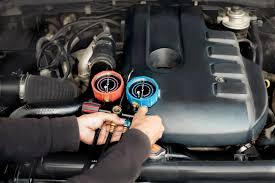Auto cooling systems rely on the AC compressor. This component moves refrigerant throughout the air conditioning system, ensuring passenger comfort in hot weather. When the compressor fails, the system is at risk, resulting in poor cooling or no air conditioning. Car owners must understand compressor failure causes and effects to avoid costly repairs and enjoy a comfortable drive.
Common Causes of Compressor Failure
Lack of lubrication is a leading cause of compressor failure. Refrigerant helps the compressor move oil through the system. When refrigerant levels drop due to leaks or faulty charging, oil circulation is disrupted, increasing friction and wearing down compressor parts. It may cause the compressor to seize or fail.
Contamination is another common factor. Ingress of moisture, dirt, or metal particles into the air conditioning system might damage the compressor. Refrigerant recharge often introduces pollutants through damaged seals or inadequate maintenance. This can damage AC parts other than the compressor, causing system failure.
Electrical issues might cause compressor failure. Due to malfunctioning sensors, wiring, or control modules, the compressor clutch may not engage or disengage properly. Operating the compressor motor under such poor conditions for a long time may cause overheating and damage.
Poor system installation or retrofitting is another concern. A new compressor installed without cleaning the AC system or replacing the expansion valve and receiver-drier can be damaged by old debris and sludge. Similar to altering refrigerants without changing system components, the compressor may fail prematurely.
Consequences of a Failed Compressor
The most immediate result of compressor failure is air conditioning loss. In excessive heat or cold, this can be uncomfortable and dangerous because it inhibits driver comfort and focus. Long drives in hot weather without air conditioning can cause heatstroke, dehydration, and weariness.
Repairs for compressor failure can be expensive and time-consuming. A compressor seizure or fragmentation often releases metal shrapnel into the AC system. Contamination may need cleaning or replacing the condenser, evaporator, and lines. A simple compressor repair can lead to a complete overhaul if not done immediately. Cars with broken air conditioning are likewise less valuable.
Preventative Actions and Prompt Repairs
Early intervention and routine maintenance are key to preventing compressor failure. The compressor’s lifespan can be significantly extended by maintaining the proper quantity of refrigerant, rapidly repairing any leaks, and planning regular AC system inspections. It’s also possible to stop minor problems from developing into significant failures by taking care of warning indicators like odd noises, decreased cooling efficiency, or odd compressor cycling patterns. For reliable diagnosis and servicing, vehicle owners should consider professional Auto AC Repair in Boulder, CO to keep their cooling systems running efficiently.
Conclusion
Car owners can take preventative measures to guarantee their air conditioning systems run effectively and dependably, particularly during the hottest summer months, by being aware of the causes and effects of compressor failure.

